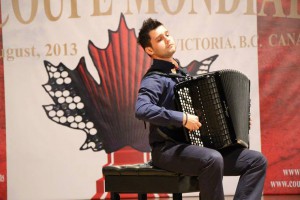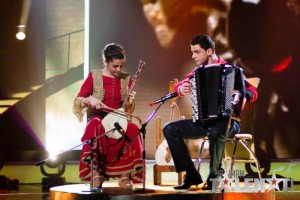 Nikola Pekovic was born on 23rd December 1991 in Kraljevo. During the first two years of high school he attended the “Stevan Mokranjac” of Kraljevo in the class of prof. Marija Vukicevic, and he was named best student of the year 2005/2006 for the music school “Stevan Mokranjac” of Kraljevo. The third and fourth year of secondary school of music (“Dr Miloje Milojevic” in Kragujevac), as well as the university attended the FU in Nis, Department of Performing Arts in the class of accordion of M° Miljan Bjeletic. He has had great success in music high school. He graduated from grade 10 to FU in Nis and the total average 9.50 at the university level.
Nikola Pekovic was born on 23rd December 1991 in Kraljevo. During the first two years of high school he attended the “Stevan Mokranjac” of Kraljevo in the class of prof. Marija Vukicevic, and he was named best student of the year 2005/2006 for the music school “Stevan Mokranjac” of Kraljevo. The third and fourth year of secondary school of music (“Dr Miloje Milojevic” in Kragujevac), as well as the university attended the FU in Nis, Department of Performing Arts in the class of accordion of M° Miljan Bjeletic. He has had great success in music high school. He graduated from grade 10 to FU in Nis and the total average 9.50 at the university level.
This allowed him to successfully implement its plans for professional development through postgraduate studies in Niš, Department of Performing Arts. Nicholas began to teach accordion at the FU Nis as an assistant since February 2014.
The last ten years has been active on stage as soloist and chamber musician in Serbia, Montenegro, Slovakia, Italy, Germany, Ukraine, Lithuania, Latvia, Greece, France, Portugal, Spain, Croatia, Bosnia-Herzegovina, Canada, Bulgaria , Slovenia, China, Belgium and Russia.
In the period from 20.06.2008 to 28.06.2008 he was in Strasbourg and played in the Assemblea Parliamentary Assembly of the Council of Europe as representative of the Musical Youth of Serbia. It included an exhibition organized by the Permanent Mission of the Republic of Serbia, the Council of Europe, on the occasion of the adoption of the European Convention for the Protection of ancient crafts and traditional during the June session of the Parliamentary Assembly of the Council of Europe Strasbourg.
Among the best Serbian accordionists, Nikola has already become professor at the Faculty of Arts in Nis (Serbia). How was your study’s path? And what do you feel being a professor, even if you are so young?
I had the luck of worked with Professor Marija Vukicevic during high school, the professor who used her free time to improve my skills. Later with my transfer to Kragujevac, that work went on with Professor Miljan Bjeletic. Professor Miljan continued even more to invest in my knowledge which resulted in international awards. The effort to make me the player I am today was so great that now I can pass the knowledges I have. Besides my family and me, these professors deserve the most praise for my success. I am happy to have the support of Dean of Faculty of Arts in Nis, Suzana Kostic and can continue my work on my music and represent Serbia, the faculty and myself in the best light in the World. The support I got by Professor Suzana since I started college was great. Her energy and dedication contribute to the growth of Faculty of Arts as an institution and students who work hard to achieve something know that they will be awarded.
I am the youngest docent in the Faculty so it brings a great responsibility. I enjoy working with good students and I give a lot of extra classes if the students want them. The students are here to receive the largest amount of knowledge possible so they can pass it on to other generations. That kind of work requires a lot of patience because not all students have the same predispositions to do immediately what they are supposed to, so it is required to be explained to the student how to use his/hers emotions to express the meaning the music writer wanted to express.
How is considered now accordion in Serbia? Have you found differences with others countries you were?
In Serbia the accordion is popular because of the folk music hence it is hard for us professional accordion artists to comprehend the fact that the accordion is not seen as an instrument for classical music too. Despite that, the people who hear the classical music for accordion, especially the musicians who play other instruments, are amazed with the capabilities of the accordion. People like to enjoy classical music not only because of the instrument but because of the artists himself, too. The accordion is interesting because it can perform all kinds of transcriptions and original works which the audience cannot hear every day in that special manner.
The Republic of Serbia, that is, the citizens of Serbia have a lot of daily and life problems so they are somewhat unable to enjoy classical music. I hope the future will be different and until then I will continue to work and practice so that the audience here can hear the music that is being created nowadays and which the later generations will remember us by. I have a rich history of competitions, a lot of solo concerts and performances and now I believe that I am supposed to start performing the works of contemporary music writers from Serbia who write for accordion and hence contribute to the development of Serbian Classical music written for my instrument. Of course, there are not a lot of them and I will do my best that in the future there will be some.
There are differences between Serbia and other countries and those differences are expressed everywhere, somewhere less, somewhere more. As I said the music depends mostly on the life style of the country. Militancy and persistence are the main characteristics of my country caused by the great injustices that was done to it, and that’s why we are different from other countries composers.
Which repertoire have you mostly studied and which one/ones do you want to descover?
I still haven’t got my favorite composer and era, because I want to upgrade myself even more in other elements of interpretation and understanding of music, but I can speak of my solo CD and the tracks on it.
Bach, Rameau, Scarlatti, Sibelius, Olsen, Bonakov, Vlasov, Kusjakov, Semionov. These are the composers on the track published by the Faculty of Arts and that can be heard on my CD. I wanted my CD to consist of all important eras of music. The accent is on accordion composers because I want my instrument to find its rightful place among other academic instruments. It is interesting how music of all eras can be performed on the accordion. Valse Triste by Sibelius is the real example, whose transcription for the accordion was written by Professor Bjeletic. Speaking of Professor Bjeletic, the CD would not be possible to publish without his support and hard work. The energy and knowledge that I got thanks to Professor Bjeletic is paramount and this CD is the crown jewel of our work. The importance of this CD is that it was the first published CD of accordion music after 10 years. The competition I was successful in wouldn’t be possible without the Professor’s help, competitions like “World Trophy” in Spain (first place), The World Cup in Canada (second place) and more other competitions.
Countless are you victories in accordion and musical competitions. How do you think they have influenced you? Do you think is important do a lot of them?
 I took part in around 50 competitions and each of them has a special part in my heart. “I got talent” is the show that surely changed my life in every aspect, and besides that I would mention the World Cup, World Trophey, The International Competition in Klingenthal, The International Competition in Castelfidardo (Italy). For these competitions it is needed practice all day long for a number of months to be able to keep up with the competitors from other nations.
I took part in around 50 competitions and each of them has a special part in my heart. “I got talent” is the show that surely changed my life in every aspect, and besides that I would mention the World Cup, World Trophey, The International Competition in Klingenthal, The International Competition in Castelfidardo (Italy). For these competitions it is needed practice all day long for a number of months to be able to keep up with the competitors from other nations.
The competitions helped me affirm myself more in the world of music and made a good cornerstone for my further plans. I think that competitions are not needed in order to advance in the world of music, only hard work and love are needed. Competitions are there to test your knowledge publicly, to compare your skills with others and interact with others’ way of producing sound and music. These are all the good things that help you understand music even better. In some competitions you win you get also solo concerts which gives new opportunities.
Serbia is the “home” of a lot great accordionists and musicians as we could see during the last 20 years. What are the most important aspect of your didactics?
Serbian school of accordion which I belong to is the combination of Eastern and Western schools. In the beginning it was only Russian school which was brought to Serbia by Professor Radomir Tomic but today it is changed and it moves in different directions. I think that generally accordion artists cannot still be compared to other instruments because school of one pianist can be developed through many centuries while in the case of accordion that is a few decades. The basic methods of work in Serbia are perseverance and dedication. We have a lot of talented artists who due to lack of funds stop practicing classical music. A great number of graduates in our country do not play the accordion, which is devastating. In the last few years everything is better because the young realized they can do more together and that the way to success is a lot harder than they assumed and there are more and more accordion artists.
What are your plans about music for the future?
Working with students, recording solo CDs and performing the works written for me, promoting my solo CD and the CD which I recorded with my sister for the National Television of Serbia. If I manage to find funds for The Royal Academy of London, where I have passed the entrance exam, I will keep on promoting accordion through scientific studies. Working with Owen Murray (Royal Academy of London) will help my development, which is undoubtedly my priority in my music career.
For the end, my usual question. Why music-accordion for Nikola Pekovic?
I come from a family of musicians. My mother played the accordion in Primary Musi School and my grandfather had two little accordions to play with. Coming to the Music School with intentions of starting it, walking down the hallway I saw a student playing accordion in some strange way to me; that impression made me take up accordion. Now, when I think about it, it was a part of my personality, I understand that I didn’t like do what other people did, but try to prove that music has no limits by always carving a path to new possibilities. For me in that moment the greatness of the instrument was so huge to made me interested to the accordion, not to piano which my aunt Tatjana Jakovljevic teaches. My aunt taught me to play the basics of piano when I was only two. My parents tell that there were a way to stop making me cry as a baby, because my aunt was always there to play classical music which back then influenced me to choose the path of music.
More info
E-mail: pekovic.nikola@yahoo.com
Questo post è disponibile anche in: Italian

 English
English Italiano
Italiano 





Leave a comment
You must be logged in to post a comment.